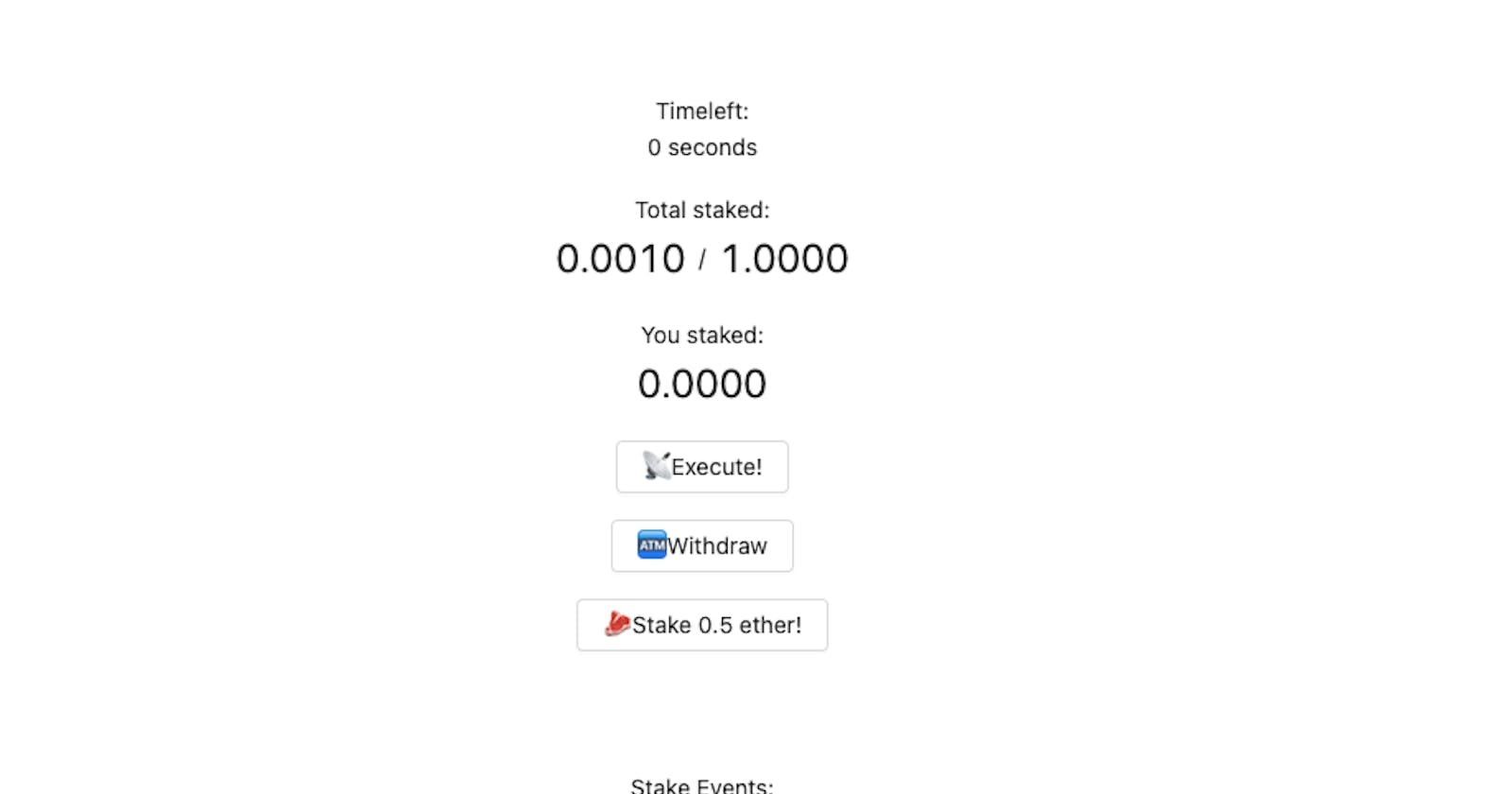How I Implemented Speed Run Ethereum Challenge 1: Decentralized Staking App
Explaining my accepted solution to Speed Run Ethereum Challenge 1
What I'm Building
In this post, I'll show you how I implemented Challenge 1 of Speed Run ETH.
Here's the description from the challenge page: https://speedrunethereum.com/challenge/decentralized-staking
🏦 Build a
Staker.solcontract that collects ETH from numerous addresses using a payablestake()function and keeps track ofbalances. After somedeadlineif it has at least somethresholdof ETH, it sends it to anExampleExternalContractand triggers thecomplete()action sending the full balance. If not enough ETH is collected, allow users towithdraw().
The Code
Deployed contract address: https://rinkeby.etherscan.io/address/0x137cbEAA01865C1Ca907e4692bc1307c72e3b9d4
Deployed UI: https://macabre-cakes.surge.sh/
// SPDX-License-Identifier: MIT
pragma solidity 0.8.4;
import "hardhat/console.sol";
import "./ExampleExternalContract.sol";
contract Staker {
// VARIABLES
/// External contract that will hold staked funds if threshold reached
ExampleExternalContract public exampleExternalContract;
/// Balances of user's staked funds
mapping (address => uint256) public balances;
/// Staking threshold
uint256 public constant threshold = 1 ether;
/// Staking deadline
uint256 public deadline = block.timestamp + 72 hours;
/// Boolean set if threshold is not reached by the deadline
bool public openForWithdraw;
// EVENTS
/// Emit when stake() is called
event Stake(address sender, uint256 value);
// MODIFIERS
/// Modifier that checks whether the required deadline has passed
modifier deadlinePassed(bool requireDeadlinePassed) {
uint256 timeRemaining = timeLeft();
if (requireDeadlinePassed) {
require(timeRemaining <= 0, "Deadline has not been passed yet");
} else {
require(timeRemaining > 0, "Deadline is already passed");
}
_;
}
/// Modifier that checks whether the external contract is completed
modifier stakingNotCompleted() {
bool completed = exampleExternalContract.completed();
require(!completed, "Staking period has completed");
_;
}
constructor(address exampleExternalContractAddress) public {
exampleExternalContract = ExampleExternalContract(exampleExternalContractAddress);
}
// Collect funds in a payable `stake()` function and track individual `balances` with a mapping:
// ( make sure to add a `Stake(address,uint256)` event and emit it for the frontend <List/> display )
function stake() public payable deadlinePassed(false) stakingNotCompleted {
// update the sender's balance
balances[msg.sender] += msg.value;
// emit Stake event to notify the UI
emit Stake(msg.sender, msg.value);
}
// After some `deadline` allow anyone to call an `execute()` function
// It should either call `exampleExternalContract.complete{value: address(this).balance}()` to send all the value
function execute() public stakingNotCompleted {
uint256 contractBalance = address(this).balance;
if (contractBalance >= threshold) {
// if the `threshold` is met, send the balance to the externalContract
exampleExternalContract.complete{value: contractBalance}();
} else {
// if the `threshold` was not met, allow everyone to call a `withdraw()` function
openForWithdraw = true;
}
}
// Add a `withdraw(address payable)` function lets users withdraw their balance
function withdraw(address payable _to) public deadlinePassed(true) stakingNotCompleted {
// check the amount staked did not reach the threshold by the deadline
require(openForWithdraw, "Not open for withdraw");
// get the sender balance
uint256 userBalance = balances[msg.sender];
// check if the sender has a balance to withdraw
require(userBalance > 0, "userBalance is 0");
// reset the sender's balance
balances[msg.sender] = 0;
// transfer sender's balance to the `_to` address
(bool sent, ) = _to.call{value: userBalance}("");
// check transfer was successful
require(sent, "Failed to send to address");
}
/// Add a `timeLeft()` view function that returns the time left before the deadline for the frontend
function timeLeft() public view returns (uint256) {
if (block.timestamp >= deadline) {
return 0;
} else {
return deadline - block.timestamp;
}
}
// Add the `receive()` special function that receives eth and calls stake()
receive() external payable {
stake();
}
}
Checkpoint 2: 🥩 Staking 💵
The first challenge after getting my environment set up is to implement staking.
I add the 2 variables needed
mapping ( address => uint256 ) public balances;
uint256 public constant threshold = 1 ether;
Then I implement the staking function
/// Emit when stake() is called
event Stake(address sender, uint256 value);
/// Modifier that checks whether the external contract is completed
modifier stakingNotCompleted() {
bool completed = exampleExternalContract.completed();
require(!completed, "Staking period has completed");
_;
}
/// Modifier that checks whether the required deadline has passed
modifier deadlinePassed(bool requireDeadlinePassed) {
uint256 timeRemaining = timeLeft();
if (requireDeadlinePassed) {
require(timeRemaining <= 0, "Deadline has not been passed yet");
} else {
require(timeRemaining > 0, "Deadline is already passed");
}
_;
}
// Collect funds in a payable `stake()` function and track individual `balances` with a mapping:
// ( make sure to add a `Stake(address,uint256)` event and emit it for the frontend <List/> display )
function stake() public payable deadlinePassed(false) stakingNotCompleted {
// update the sender's balance
balances[msg.sender] += msg.value;
// emit Stake event to notify the UI
emit Stake(msg.sender, msg.value);
}
Since the stake function is marked as payable, the function is able to recieve ether and has access to the sender's address through msg.sender and the amount of ether sent through msg.value.
Using these variables, I can update the contract's balances mapping with the total amount of ether that address has sent.
You'll notice I didn't have to initialize balances[msg.sender] to 0. Solidity will automatically initialize variables to 0 values.
After updating, the function emit's a Stake event. This is how I alert the UI that something has happened on the blockchain.
Extra Credit - modifiers
I've included 2 modifiers here that are useful for later challenges. I separated these specific validations because they're needed in multiple functions as we'll see later.
The first is deadlinePassed. If I pass false to this modifer, it means the function will only execute if the deadline has NOT passed. We'll see a different usage of this modifier in the withdraw function.
There is also the stakingNotCompleted modifier. If the balance has already been sent to the external contract, staking is completed and execute will fail and revert.
Checkpoint 3: 🔬 State Machine / Timing ⏱
The next checkout is the core logic of the contract. I need to keeps track of what state the contract is in. Is it open for staking? Does the contract balance exceed the threshold? Have we passed the deadline?
I'll walk through each function separately.
First, there's execute
// Staking deadline
uint256 public deadline = block.timestamp + 30 seconds;
/// Boolean set if threshold is not reached by the deadline
bool public openForWithdraw;
// After some `deadline` allow anyone to call an `execute()` function
// It should either call `exampleExternalContract.complete{value: address(this).balance}()` to send all the value
function execute() public stakingNotCompleted {
uint256 contractBalance = address(this).balance;
if (contractBalance >= threshold) {
// if the `threshold` is met, send the balance to the externalContract
exampleExternalContract.complete{value: contractBalance}();
} else {
// if the `threshold` was not met, allow everyone to call a `withdraw()` function
openForWithdraw = true;
}
}
This first checks if the deadline has passed or not through the stakingNotCompleted modifier.
If the staking is not completed, we next check the contract balance and see if it's exceeded the threshold. If so, we complete the staking period by sending the balance to the external contract.
If not, I set the openForWithdraw boolean to true and allow everyone to withdraw their money back.
Next, let's look at the withdraw function
// Add a `withdraw(address payable)` function lets users withdraw their balance
function withdraw(address payable _to) public deadlinePassed(true) stakingNotCompleted {
// check the amount staked did not reach the threshold by the deadline
require(openForWithdraw, "Not open for withdraw");
// get the sender balance
uint256 userBalance = balances[msg.sender];
// check if the sender has a balance to withdraw
require(userBalance > 0, "userBalance is 0");
// reset the sender's balance
balances[msg.sender] = 0;
// transfer sender's balance to the `_to` address
(bool sent, ) = _to.call{value: userBalance}("");
// check transfer was successful
require(sent, "Failed to send to address");
}
Once the modifiers are passed, I check that the contract is open for withdraw and that the user has ether to send back. Before actually sending the ether, notice that I set the sender's balance to 0 in the contract's balances mapping.
I always want to make all state changes before calling other contracts or sending ether. This prevents something known as a Re-Entrancy attack. If we were to send the balance before setting the sender's balance to 0, it's possible for the sender to call withdraw multiple times before the _to.call function completes. The contract will think the sender still has an ether balance and will keep sending extra ether until the first call completes.
Finally, after all checks have passed, I send the ether and check that the transfer was successful.
The last function to mention is the helper function timeLeft
/// Add a `timeLeft()` view function that returns the time left before the deadline for the frontend
function timeLeft() public view returns (uint256) {
if (block.timestamp >= deadline) {
return 0;
} else {
return deadline - block.timestamp;
}
}
This is used in deadlinePassed to see how much time is left in the staking period.
Checkpoint 4: 💵 Receive Function / UX 🙎
For this checkpoint, we implement a receive function to automatically stake eth which has been sent to the contract address.
// Add the `receive()` special function that receives eth and calls stake()
receive() external payable {
stake();
}
So What Did We Do?
I updated the code to point at the Rinkeby ethereum test net and deployed the frontend to https://macabre-cakes.surge.sh/
You can try it out for yourself although the staking period is over by now.
Now on to Challenge 2: Token Vendor.
See you then!

